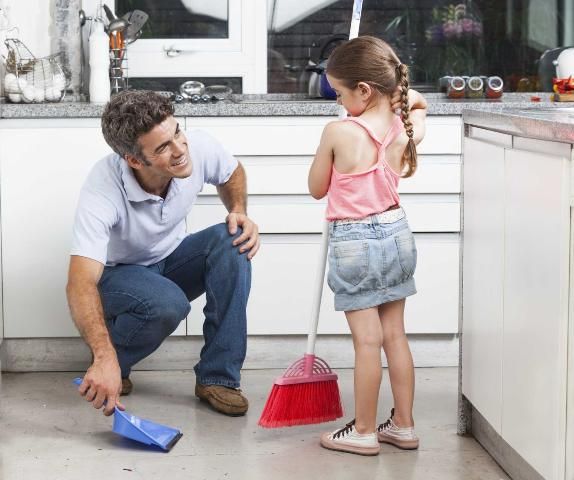
Credit: gmast3r/iStock/Thinkstock
The way you clean and maintain your home will affect the health of your family, especially children. The incidence of children diagnosed with asthma is increasing. You can help make your home safe and healthy for your children by eliminating or controlling the risks outlined in this publication.
Dust and Dust Mites
Dust mites are too small to be seen but are found in most homes. They live in mattresses, pillows, carpets, fabric-covered furniture, bedding, and stuffed toys. To control them:
- Use dust-proof or plastic-zippered covers over the mattresses and pillows.
- Keep mattresses off the floor by using a bedframe or platform on which to rest them.
- Wash sheets and bedding weekly.
- Keep children's stuffed toys clean, and wash them often.
- Install hard floors if possible. If carpets are used, vacuum them frequently in areas where children play and at least weekly in other areas of the residence. (Remember children are often on the floor near carpets and dust. If shoes are worn in the residence, whatever particulate is on the soles of those shoes could be accessible to those children.)
Pets
Our pets' urine, skin flakes, hair, and saliva can trigger asthma and other allergies.
- Keep pets out of the bedroom and other sleeping areas.
- Keep pets off beds and furniture where children sleep.
- Keep pets clean; bathe them often.
- If practical, keep pets outdoors.
- Keep pets' bedding clean.
Molds
Mold and mildew are known triggers of respiratory problems. The key to mildew and mold control is moisture control.
- Wash mold/mildew off hard surfaces.
- Fix leaky faucets and other water-supply systems.
- Keep drip pans for air conditioners and refrigerators clean and dry.
- Use exhaust fans in the kitchen and bathrooms when bathing, cooking, or using the dishwasher. If you do not have an exhaust fan, open windows while you perform the activity, and then close the windows if it is humid outside.
- Keep clothing, furnishings, and bathrooms dry.
Pests
Droppings and body parts of pests such as cockroaches and rodents create health problems.
- Dispose of all food scraps and garbage.
- Store food in airtight containers.
- Clean up all spilled crumbs and liquids immediately.
- Try using boric acid for roaches and traps or poison bait for other insects. Keep poisons out of children's reach.
- If sprays must be used, follow instructions on the label.
Be careful to use insecticides and sprays on infected areas only, and avoid breathing them.
Paint
Paint sometimes peels and is unattractive. It can also be dangerous. If the paint is old (pre-1978), it may contain lead. Extreme care should be used to remove old paint and its dust. If children ingest or breathe lead-based paint, it can lead to severe neurological damage.
Secondhand Smoke
Research has proven that children and others can be adversely and severely affected by breathing secondhand smoke.
Household Products
Special precautions should be taken to store cleaning supplies and medicines where they are out of reach of children. Common household products can be toxic for children and can poison them. Keep these and all harmful products stored in such a way that children cannot access them.
Remember: A healthy home = a healthy family.